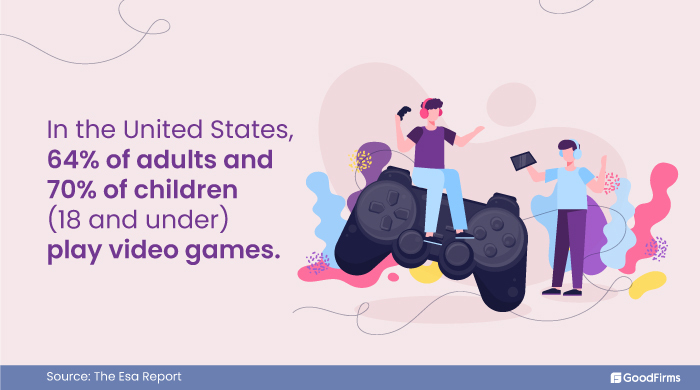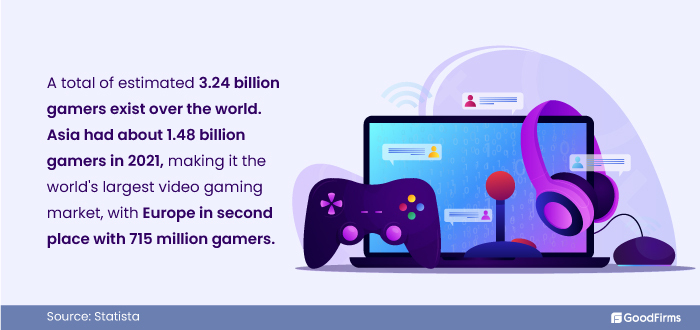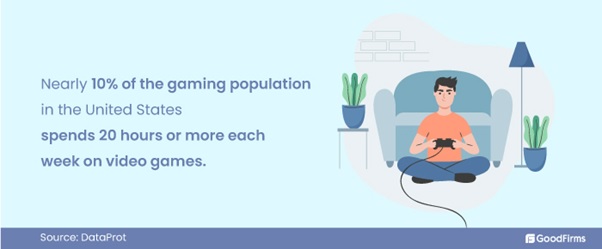ABSTRACT:
The online gaming industry is embracing structural, technological, behavioral, and economic shifts. The meteoric rise of social gaming and massively multi-player online games (MMOs) after the pandemic has further added momentum to the growth of the gaming industry. Cloud-based infrastructure coupled with robust 5G networks is taking the gaming user experience to the next level. The combination of AI, blockchain and AR/VR brings seismic changes in how gaming services are delivered to the end-user. Online games have become a cultural phenomenon. The social and cultural significance is huge.
Gaming streams and E-sports are the new normals in the online gaming world. The maturation of e-sports has pushed the industry's lucrative and entertaining potential even further. New-age monetization methods such as games as a service (GaaS) subscription models, in-game advertising, in-app purchases, etc., are enabling gaming developers to earn more than ever before.
The research ‘Online Gaming: Trends and Market Opportunities’ attempts to explore the key trends in online gaming and business opportunities in the booming online gaming industry. The research also reveals the top challenges the industry faces and what the future holds for it.
Table of Contents:
Introduction
Overview of the Online Gaming Market
Top Trends Ruling the Gaming Industry In 2022
- Gaming Industry Transitions from Product-Centric Approach to Experience-Centric Regime With AR/VR
- 5G Turbocharges Gaming Speeds and Spurs Cloud Gaming Developments
- AI Powers Games Recommendation and Hyper-personalized Gaming Services
- The Highly Addictive Hyper-Casual Games Continue the Growth Momentum
- Cloud Gaming Takes Multi-Player Gaming to the Next Level
- Metaverse Will Power the Future of Online Gaming
- Esports: Competitive Online Games Blend into Mainstream Gaming Culture
- The Puzzle Gaming Genre
- Multiple Gaming Platform
- Community Building Within Online Games
- Gamification in Education and Corporate Training
- Rise of In-Game Advertising
- Human-Robot Teaming (HRT)
- SmartPhones Are Replacing Gaming Consoles, PC Gaming, and Playstations
- Blockchain is Changing the Online Gaming Ecosystem
Opportunities in the Online Gaming Industry
- Social and Cultural Significance
- Ludic Strategy in Education
- A Leadership Simulator
- Marketing the Health Benefits of Online Gaming
- Developing High-End Gaming Platforms for the Gen Z Players
The Gaming Industry's Major Challenges
Key Findings
Conclusion
Introduction
Edward Castronova, in his book “Synthetic Worlds,” stated: Online games are essential. They have economic consequences. The money earned inside these virtual worlds is not merely like money; it is money. The perspectives revealed can have a direct impact on real-world financial systems. Yes, he is true; the pride earned has a direct impact; the fame earned depicts the real world.
Gamers were once considered schoolyard outcasts, work-shy dreamers, and lone rangers who struggled to fit into society. But the old prejudices are no longer valid; everyone now enjoys gaming, from women to athletes, children to accountants. With the rise of artificial intelligence (AI), augmented reality (AR), and mobile marketing, our world is gradually becoming a gamer's paradise. Although gaming has a long history of being associated with hard-core fans and youngsters, the rise of mobile gaming, high-quality gaming content, social gaming, and increasing accessibility in the last decade has increased the number of people who consider themselves online gamers. The enormous expansion of gaming throughout the pandemic has demonstrated that many people in solitude have discovered a new outlet for much-needed interaction.
Globally, there were an estimated 3.24 billion gamers in 2021(1). The gaming business will be worth $257 billion in 2025(2). For years, the gaming sector has posed a riddle that few marketers have been able to solve, as marketing in the gaming business has always been unpredictable and stressful.
This research entails all the top trends and opportunities ruling the gaming industry in 2022. This research also covers all the technological advancements that influence the future of video games and affect the gaming experience.
Overview of the Online Gaming Market
Mobile gaming has gained massive popularity in the past few years. Video games have been steadily gaining in popularity for years. The pattern has intensified as individuals seek new methods to socialize and stay occupied during the pandemic. Currently, the gaming industry is leading more than the film and sports industries combined.
The gaming business is on the verge of fresh innovations and technological advancements.
Key Online Gaming Industry Stats according to recent surveys:
- The gaming business will be worth $257 billion in 2025(3).
- Globally, there were an estimated 3.24 billion gamers in 2021(4).
- 227 million Americans played video games as a stress booster during the pandemic(5).
- Games accounted for 67% of total app revenue(6).
- 65% of all gamers said they played games with people in 2020, whether online or in person. By 2021, the percentage had risen to 77%(7).
- As many industries collapsed during the pandemic, the game industry rose 12% to $139.9 billion in 2020, up from $120.1 billion in 2019(8).
- The worldwide video game business will reach $314.40 billion in 2026(9).
- Many gamers value the social aspects of gaming. Overall, 84% of respondents said video games helped them interact with people who shared their interests. In addition, 80% of gamers who responded said that video games helped them meet new people(10).
Top Trends Ruling the Gaming Industry In 2022
Gaming Industry Transitions from Product-Centric Approach to Experience-Centric Regime With AR/VR
Augmented Reality: The widespread usage of smartphones has benefited game developers in using augmented reality as a storytelling tool. AR overlays digital objects and audio over the gamer's real-world surroundings. It's what adds to the attraction and accessibility of the format. According to a report, the market for AR and VR video games will reach $11.0 billion by 2026. From 2021 to 2026, the growth rate is 18.5%(11).

The constant rise in mobile gamers has had a favorable impact on augmented reality game demand. Various prominent manufacturers have released augmented reality applications, providing gamers with new ways to engage with real-life games.
Virtual Reality gaming software creates 3D environments that can be utilized in virtual reality games. Software engineers create a virtual environment for users so that they may interact with the places and items in the real world. Companies are constantly releasing new games and content due to the wide variety of virtual reality headsets presently accessible. VR headsets' prices are likely to reduce in the coming years(12).
5G Turbocharges Gaming Speeds and Spurs Cloud Gaming Developments
5G Gaming Technology: Unlimited internet plans and 5G coverage are gradually becoming the norm worldwide, providing mobile gaming a significant boost. When it comes to internet speed, 5G can be up to 10 times quicker than 4G(13), so gamers on the go will not be left behind.

5G also aids cloud gaming development, one of the gaming trends for 2022. Because smartphones have limited storage capacity, it's a wonderful concept to avoid clogging up the memory with a sophisticated game.
AI Powers Games Recommendation and Hyper-personalized Gaming Services
In gaming, Artificial Intelligence (AI) refers to adaptable and responsive video game experiences enabled by non-playable characters responding creatively as if a human game player commanded them.
Artificial intelligence in gaming aims to improve the player's experience. AI that adapts hyper-personalization and recommendations improves games, enhances user experience, fits the player's skill level, increases immersion, and creates a personalized gaming experience. It's especially critical now that game creators deliver games to various platforms. Gaming is no longer just a choice between a console and a desktop PC. Instead, gamers expect rich game experiences on mobile and wearable devices, including smartphones, VR headsets, and other gadgets. AI allows developers to create console-like experiences on a variety of devices.

The Highly Addictive Hyper-Casual Games Continue the Growth Momentum
Hyper-Casual Games are small, have simple mechanics which require very little design, and are usually free to play. They're simple to play and quite addictive. Users are not encouraged to pay for material in the games; instead, they "pay" with their time.
Meanwhile, the most popular games from the mid-core and sports genres were Garena Free Fire and 8 Ball Pool. While Coin Master, Among Us, and 8 Ball Pool also topped the rankings in the United States, Call of Duty: Mobile beat Free Fire(14).
The global online gaming market will increase at a CAGR of 11.9% by 2026(15). These market estimates and projections point to a massive increase in the hyper-casual video game segment in the coming years.

Cloud Gaming Takes Multi-Player Gaming to the Next Levels
Cloud Gaming is a revolution that has the potential to transform the entertainment and gaming industries completely. There is no need to download or install any games on a mobile phone, PC, or console using Cloud Gaming which also encourages large-scale multiplayer gaming. Streaming games will be the norm by 2022(16). In cloud gaming, it is not necessary to purchase new hardware regularly to play the most recent games. Users can play any game, anywhere, on any device, with just an internet connection.
Competitive Multiplayer Mobile Gaming has proven to be a key trend, with eSports becoming a global phenomenon where players can directly compete with each other. Single-player games are less engaging, enjoyable, demanding, and appealing than multiplayer games. The reason for this is the game's social interaction aspect, which allows players to compete against actual people, making the game more unexpected and engaging(17).

Metaverse Will Power the Future of Online Gaming
The introduction of Metaverse in gaming, propelled by disruptive VR technology, has created a whole new level of realism in gaming. Because of a very immersive virtual experience in gaming, Metaverse has altered the gaming business and helped it acquire significant popularity.
The metaverse's potential for real-time virtual experiences in work, education, commerce, and gaming has grown with the present epidemic. By merging attention, census, and locus, it transforms online gaming into an interactive three-dimensional platform.
Metaverse is a virtual environment that aims to bring people from all over the world together on a common digital platform to engage and socialize. Metaverse game developers combine leading technology like 3D reconstruction, augmented reality, virtual reality, the Internet of Things (IoT), artificial intelligence, and blockchain to create more immersive versions of Metaverse. The most recent Metaverse advancement has forced gaming businesses to transition to Metaverse games.

The Metaverse has gained people’s attention for its persistent nature. It means that players do not need to turn on or off the gaming platform, and it continues to exist even after they have finished their session. Furthermore, Metaverse engages players by giving a virtual place for the digital duplication of our real-world environment.
On the Metaverse platform, players can have a near-reality experience while playing games. They can communicate with other players, trade in-game assets, and even use haptic gloves and coats to experience a physical sense of touch. In the metaverse games, in-game items have real-world value. Gamers can make real money in the Metaverse by selling their virtual assets via NFTs. Both Decentraland and The Sandbox are metaverse games where players can purchase, sell, and own NFT collectibles(18).
Humans are likely to encounter a much-improved version of Metaverse in the future(19). Many companies have introduced next-generation gaming systems while Metaverse is still in its early stages.
Esports: Competitive Online Games Blend into Mainstream Gaming Culture
Global investors, companies, media outlets, and consumers are all paying notice as competitive video games continue to blend into mainstream culture. In fact, in 2022, 29.6 million people will watch esports every month, increasing 11.5% from 2021(20).
The esports industry's popularity has aided in esports investment and revenue growth. Increasing craze of live broadcasting and gameplay, esports has gained new heights. Fans directly connect to players and teams on video gaming-specific streaming, while social media has allowed them to expand.
1. The core of esports revenue has always been sponsorships. Sponsorship is a big part of the esports sector, accounting for about 60% of esports earnings last year(21). Because the esports audience is youthful, varied, and rising, it attracts brand sponsorships like a magnet.
Companies in the esports industry are attempting to diversify their revenue streams. As a result, teams and organizers are increasingly looking for ways to monetize fans directly because esports audiences have been overwhelmingly positive about blockchain and NFTs.

2. Mobile esports have grabbed the market by storm following years of dominance by PC games. Mobile has attracted millions of esports fans worldwide due to its low entry hurdles. Smartphones are often low-resolution, allowing mobile esports to thrive. Advances in 5G technology will boost mobile internet connections, making esports more stable and viable.
The mobile esports companies host competitions in different parts of the world, attracting a more significant esports viewership. The more individuals who watch and play, the more firms will invest, and mobile esports will grow stronger.
3. The two amicable markets of traditional sports and esports are now starting to merge. Esports teams, for example, are growing into lifestyle brands (i.e., brands that are a part of customers' daily lives). The best example is Esports team EVOs, which recently unveiled a real-world basketball squad(22).
4. More platforms and publishers are expected to launch live-streaming-first solutions that leverage creator-viewer engagement in the coming months. These types of experiences will assist in making the broadcasts even more entertaining and memorable and provide new ways to monetize fans directly.
The Puzzle Gaming Genre
The Puzzle Gaming Genre has undergone many changes. Puzzle-solving encourages creativity, while social media platforms allow people to demonstrate their skills and connect with others in similar groups. Puzzle gaming is expected to reach $24,719 million in 2022; the puzzle video game segment's total sales will reach $35,163 million by 2026(23).

Multiple Gaming Platform
Multiple Gaming Platform implies making a video game that can be played on numerous platforms simultaneously. It's challenging to make games that can be played on multiple devices and consoles. This feature allows users to bridge the gap between various systems, such as gaming consoles, laptops, mobile devices, etc.
Community Building Within Online Games
Online fan communities are a crucial component of a video game's market success, and game makers have begun to appreciate cultivating online communities for their games. The game developers believe that online communities are critical to the success of both single-player and multiplayer games and actively support and nurture them(24).

Online gaming communities come in various shapes and sizes. Some focus on game reviews, others on specific games and franchises, others on news or guides, and others with multiple facets and discussion threads for every gaming topic. They're also packed with other players looking to connect and participate while playing at home. Learning from other players, taking up tips and methods through discussion threads, or simply increasing excitement and sense of connection can all help to enhance the game. Furthermore, it might assist in the growth and establishment of the audience.
Gamification in Education and Corporate Training
Gamification is the process of incorporating game-like features into non-game situations. Teachers are developing quest-based games for their students to learn into a long game with the chance to level up, collect badges, win fights, and eventually complete the game.
Gamification's essential value in corporate elearning motivates employees to do mundane but necessary tasks. Using game components in training reinforces employees' goals and the required learning to execute their responsibilities successfully(25). Gamifying a process, such as meeting a sales target or replacing a dull webinar, encourages competition and participation.
Rise of In-Game Advertising
One of the most effective revenue channels for promoting mobile apps is in-game advertising. From $6,059.2 million in 2020 to $13,989.6 million in 2021–2028, the global in-game advertising market is expected to increase at a robust 11.2% CAGR(26). Incorporating advertising into new, highly anticipated games can elicit a positive response from players while also generating significant cash. Furthermore, this sort of advertising can create awareness and visibility. In-game advertising channel has significantly less competition than other channels. This platform also gives promoters a massive reach and the ability to elicit a strong response from the general public.
Human-Robot Teaming (HRT)
Human-robot teaming (HRT) is becoming more widespread as robots grow more capable(27). There's a lot to learn from gamers: several of the abilities and mindsets required to play MPOGs are directly applicable to future human-robot partnerships. Few benefits of using robots:
- A robot can play 24/7.
- A robot can be either male or female. A gender-neutral robot might potentially appeal to a broader range of people.
- A robot can mimic the actions of gamers, eliciting strong emotions. Gaming culture is frequently combative. The robot may be violent, causing gamers to reflect on their behavior.
- In-game, a robot can engage and chat at the same time. Humans can only have one output, whereas robots can have multiple.
Understanding the link between human-robot collaboration and multi-player online games provides a roadmap for future work.
SmartPhones Are Replacing Gaming Consoles, PC Gaming, and Playstations
Smartphone technology has advanced dramatically in the last ten years. As a result, a smartphone replaces various devices, including game consoles. A quarter of global gaming revenue comes from mobile gaming(28). The reasons are simple: today's generation prefers to play together with their coworkers or classmates during their free hours at work or school. At the same time, mobile gaming can reach a wider audience because all you need is a smartphone, which virtually everyone has, and playing games with coworkers or students strengthen bonds between people and fosters acceptance.
Blockchain is Changing the Online Gaming Ecosystem
The online gaming industry is being impacted by blockchain technology in practically every way. It's tokenizing virtual items, enhancing payment options, and paving the way for a slew of new game types(29). The blockchain adds value to the distribution of games. Game creators can reach consumers directly through a decentralized marketplace rather than publishing to a centralized marketplace (such as the Apple App Store). The developers pay a fraction of what they would ordinarily spend in sales fees because they are eliminating a centralized intermediary once again.
Opportunities in the Online Gaming Industry
Social and Cultural Significance
“Games are psychological safe spaces where we can encounter crises before they arise,” said Jane McGonigal, a well-known game designer.
McGonigal brought out an immersive online game simulating a pandemic back in 2008(30).
She is also well recognized for having created games simulating dire developments like a cryptocurrency collapse or mass migration. By creating a game on the potential challenges, she has been preparing the players for the future along with creating scope to shape it.
“The best way to predict the future is to invent it,” Alan Kay, a Computer scientist, mentioned in a statement.
Online games can be made as scientific breakthroughs to put off catastrophe. It is all about learning to survive and make wiser choices. Also, players adapt techniques to play a better game. Such games are directly associated with humans in society.
Ludic Strategy in Education
The ludic process contributes to personality development and the ability to find solutions to various situations:
- Intention to play and the necessary initial training;
- Game freedom and compliance with the rules, following the instructions and game pattern;
- Invitation to participate in the game, initiative shown at the start and throughout the game;
- Repetition of game elements and their variability;
- Having a useful material result and game satisfaction;
- Use of real objects and accomplishment of symbolic actions.
Including the ludic strategy must be well-thought-out, necessary, and mandatory in the educational process. The ludic process establishes a real-world context for effort and overcoming difficulties, helping to develop ludic morality(31). As a result, the ludic process is involved in the origin of socio-humane behavior and the learning of discipline aspects in preschoolers and pupils' behavioral expression.
A Leadership Simulator
Online MMORPGs (massively multiplayer online role-playing games) can also depict real-world role-playing leadership platforms. It can offer a sneak peek preview of the future real-world business landscape(32).
Games can typify workforces, centralized, decentralized, freelancers, individuals, and collaborative work activities – all created in frame-shifting episodes as illustrated by Goffman’s theory of frames. Online games depict the real world by taking leadership, mitigating risk, quickly adapting to the changing conditions, keeping track of co-players, transparency, incentives, and many more elements. In short, these games can bring out some of the qualities of today’s and tomorrow’s business leaders.
Marketing the Health Benefits of Online Gaming
Video games can improve mental and physical health(33). Gaming can aid persons with multiple addictions or cravings and reduce stress. Playing video games teaches people skills that they can apply in real life.
- To ensure that gamers are also physically active, game developers are now beginning to build such games that are played throughout physical space, basing the game around real-world locations and events.
- Playing games can aid with stress and despair.
- Playing games have a positive effect on memory.
- Video games can also assist in being more perseverant. Either win or keep trying; games can help people be more confident and tenacious in achieving goals and learning from their failures.
- Those who play games are more likely to have high social skills and develop better relationships due to the cooperation, social, and collaborative components.
- Video games can assist in making better choices and life decisions.
- People have used gaming to socialize while on lockdown, which has increased the number of users in the gaming industry.
Developing High-End Gaming Platforms for the Gen Z Players
Technology is evolving at a quick pace. Create a platform with the most up-to-date features and continually upgrade it to give players the greatest possible experience. To build a devoted following, consider surprising consumers with new features and providing incredible value. Use features like real-time push notifications, chatbots, and cryptocurrencies for easy transactions.
The Gaming Industry's Major Challenges
Gaming Industry's Laws and Regulations
Each category of games has its own set of rules and regulations, just as various types of games are played worldwide(34). The laws cover everything from gambling to sports to prize marketing. All of this is contingent on how the games are set up. Companies who deal with these games must also know the rules, regulations, and sponsorship restrictions.
End-Users Experience and Retention
Nowadays, companies are handling a lot of pressure to retain their players. Marketers don't realize that even the tiniest issue or annoyance can impact a player's desire to keep playing the game or visiting the website or game, so gaming companies should strive to build rich, linked, and personalized experiences that customers will enjoy. This will also help to boost the gamer's lifetime value.
Investment in Development, Production, and Marketing Costs
Because the gaming industry is quickly expanding, all companies must invest heavily in development, production, and marketing. These are frequently very high, and it's an issue that this industry must deal with. Thanks to data proliferation, marketers worldwide find it easier to target the correct audience based on their interests and demographic profiles. The more marketers target an ad, the more valuable the impression it creates.
Subscription Issues in GaaS (Gaming as a Service)
In games as a service, the player has to pay an estimated price for the initial round and then pay a monthly subscription fee to the game's makers to keep playing the game. An approach to further monetizing a game is offering it as a service. In classic single-player games, this service paradigm can be used. The developers update new stuff regularly and try to entice players to buy it. It is a severe issue that will only worsen in the following days. At the moment, the only way for gamers to stop it is to boycott developers who adopt this business model.
Gaming Content Issues
Many video games focus primarily on violence and gender concerns(35). Violent images may have a more significant impact on younger children and those with emotional, behavioral, or learning issues. Children may get desensitized to violence, emulate it, and become more aggressive.
Cybersecurity and User Privacy Challenges
With the advent of real-world money, fraudsters have found an excellent target in online gaming sites and users(36). Users engage in microtransactions to obtain virtual in-game stuff, which presents a profitable opportunity for cybercriminals. Gaming accounts are frequently linked to credit cards and payment processors like PayPal. While users may be willing to share some information with a firm, other details might be utilized to create a profile of users' habits and personalities. This information can then be sold to advertisers, who bombard users with irrelevant advertisements. Or, even worse, it could be stolen from you due to a data breach.
Monetization Challenges
One of the most critical elements to consider when making a mobile game is revenue. Because it requires a lot of money, time, and effort to create and maintain a game, it's vital to figure out how to make money from it, not just to cover costs but also to make a profit. As a result, in the creation process, marketers must integrate monetization as part of the design to ensure that the game and monetization model complement each other.
Extreme Competition
Online versions of games that people have played for centuries are rapidly evolving — and new ones are being invented every day. Online gaming is predicted to continue to expand as one of the world's fastest-growing industries. Gambling companies will continue experimenting with new strategies to gain a competitive advantage, like promotions and affiliate marketing. So to survive the competition, the gaming companies need to excel in their sector.
Gaming Scams and Reputation Risks
Gaming is all about the community, and a fraudulent community destroys the experience for everyone. If fraudsters overtake a game, it can swiftly kill a game developer's reputation and alienate gamers who won't stick around. Because good gaming experiences are so crucial to a game's success, developers are in a difficult position to combat fraud. While earning a profit, they must sustain client loyalty, deliver a positive gaming experience, and screen out bad actors.
Solutions:
Keep Updating With The Latest Trends.
The online gaming industry is constantly evolving with time. Because there's always a new game, update, or trend, it's simple for certain games to fall behind. For example, if an MMORPG (Massively Multiplayer Online Role-Playing Game) becomes too monotonous, it will lose players until updates are added to keep people interested(37).
This isn't only for game developers, though. Content developers such as streamers, game reviewers, and bloggers are also affected. It will be vital to be aware of current online gaming trends to generate timely updates.
Pay Attention To The Players' Requests.
Listening to the players is another vital factor in the online game production industry. There have been multiple instances where fans and gamers have been disappointed by new online games or improvements. Typically, these aren't unwarranted, as player complaints are usually related to gameplay, story authoring, or design.
It's important to remember that online games rely on their users to remain competitive. As a result, it's critical to pay attention to their feedback to build a game that they'll enjoy.
Gaming Experience Stands as the Top Priority
Essentially, games are played for the enjoyment of the players. Whether watching them or having streamers play them, they're a source of amusement. Game designers must remember that the more enjoyable a game is, the more likely it will succeed.
A game that runs smoothly and has many features and playability becomes successful and famous in the gaming community. Along with making it fun, Game developers should make sure it's free of issues that could hinder the player's enjoyment. For example, ensuring that the servers are up and running, that issues are corrected, and that player complaints are heard and addressed.
Key Findings
- With the rise of artificial intelligence (AI), augmented reality (AR), and mobile marketing, the world is gradually becoming a gamer's paradise.
- The constant rise in mobile gamers has had a favorable impact on augmented reality game demand.
- Companies are constantly releasing new games and content due to the wide variety of virtual reality headsets presently accessible.
- Unlimited internet plans and 5G coverage are gradually becoming the norm worldwide, providing mobile gaming a significant boost.
- AI that adapts hyper-personalization and recommendations improves games, enhances user experience, fits the player's skill level, increases immersion, and creates a personalized gaming experience.
- It is not necessary to regularly purchase new hardware to play the most recent game in cloud gaming. Users can play any game, anywhere, on any device, with just an internet connection.
- The metaverse has the potential to merge attention, census, and locus to transform online gaming into an interactive three-dimensional platform.
- Mobile gaming can reach a wider audience, and playing games with coworkers or students strengthen bonds between people and fosters acceptance.
- The mobile esports companies host competitions in different parts of the world, attracting a more significant esports viewership. The more individuals who watch and play, the more firms will invest, and mobile esports will grow stronger.
- Gaming Experience is the top priority of Game-Developers.
- Blockchain is transforming the online gaming ecosystem.
Conclusion
In 1940, the game Nimtron allowed players to have fun with mathematics. Since then, the online gaming industry has evolved. The 1960s saw a massive innovation with the internet and networks growing to accommodate more experiences. Today, gambling games in casinos have moved online; mobile gaming has emerged to fit players' demands and expectations; Virtual reality and augmented reality have added the much-needed energy to online games. There is a thin line now between reality and virtual games. Blockchain and Metaverse are stepping into this to improve the user’s experience. With the ongoing changes in technology, it will be interesting to see the evolution of the online gaming industry in the future days to come. Players will experience more realistic, fully immersive simulations on displays and lenses as developers deliver new advancements.
This research clarifies what motivates customers to play games and what types of gaming experiences they prefer. This research covers all the major gaming trends and opportunities in the online gaming sector, the significant challenges the gaming industries face, and the health benefits of gaming on people.
References
- https://www.statista.com/statistics/293304/number-video-gamers/
- https://www.prnewswire.com/news-releases/global-gaming-market-expected-to-exceed-256-billion-by-2025-301182238.html
- https://www.prnewswire.com/news-releases/global-gaming-market-expected-to-exceed-256-billion-by-2025-301182238.html
- https://www.statista.com/statistics/293304/number-video-gamers/
- https://www.theesa.com/resource/2021-essential-facts-about-the-video-game-industry/
- https://www.businessofapps.com/data/app-revenues/
- https://www.theesa.com/resource/2020-essential-facts/
- https://www.superdataresearch.com/reports/2020-year-in-review
- https://www.mordorintelligence.com/industry-reports/global-gaming-market
- https://www.statista.com/statistics/1235068/online-gaming-social-aspects/
- https://www.industryarc.com/Report/16349/augmented-reality-virtual-reality-market-for-gaming-industry.html
- https://www.forbes.com/sites/charliefink/2017/08/21/behind-those-high-end-vr-price-cuts/?sh=57ce7d552f81
- https://www.thalesgroup.com/en/worldwide-digital-identity-and-security/mobile/magazine/5g-vs-4g-whats-difference#:~:text=With%205G%20reaching%2010%20gigabits,5G%2C%20it%20takes%20just%20nine.
- https://www.pocketgamer.biz/news/75941/hypercasual-titles-account-for-31-of-mobile-game-downloads-in-2020/
- https://www.researchandmarkets.com/reports/5240913/global-online-gaming-market-2020-2026
- https://cloud.google.com/blog/products/gaming/gaming-industry-predictions-technology-trends-cloud-streaming-ai-ar
- https://projekter.aau.dk/projekter/files/239536830/MED10_4_Master_Thesis_Report_Final.pdf
- https://research.thetie.io/metaverse-mania-an-overview-of-decentraland-and-sandbox/
- https://www.jpmorgan.com/content/dam/jpm/treasury-services/documents/opportunities-in-the-metaverse.pdf
- https://www.insiderintelligence.com/insights/esports-ecosystem-market-report/
- https://www.roundhillinvestments.com/research/esports/how-do-esports-teams-make-money
- https://afkgaming.com/mobileesports/news/evos-esports-may-reportedly-be-expanding-and-picking-up-a-basketball-team
- https://www.statista.com/outlook/dmo/app/games/puzzle-games/worldwide
- https://link.springer.com/chapter/10.1007/11558651_12
- https://www.researchgate.net/publication/344225524_Gamification_in_Corporate_Training_to_Enhance_Engagement_An_Approach
- https://www.researchdive.com/8527/in-game-advertising-market
- https://www.researchgate.net/publication/349897809_Competitive_Physical_Human-Robot_Game_Play
- https://www.statista.com/topics/1906/mobile-gaming/
- https://www.researchgate.net/publication/348847754_Beacons_and_Blockchains_in_the_Mobile_Gaming_Ecosystem_A_Feasibility_Analysis
- https://www.wsj.com/articles/jane-mcgonigal-believes-games-can-change-the-world-11647620651
- https://www.sciencedirect.com/science/article/pii/S1877042815055962
- https://hbr.org/2008/05/leaderships-online-labs
- https://www.researchgate.net/publication/225047822_Role_of_Video_Games_in_Improving_Health-Related_Outcomes_A_Systematic_Review
- https://www.bemidjistate.edu/academics/departments/political-science/wp-content/uploads/sites/40/2015/05/nelson-thesis1.pdf
- https://www.tandfonline.com/doi/abs/10.1080/19312450802458950?journalCode=hcms20
- https://aip.scitation.org/doi/pdf/10.1063/1.5033679
- https://www.academia.edu/55154602/Massively_Multi_Player_Online_Role_Playing_Games_Whats_the_Risk










